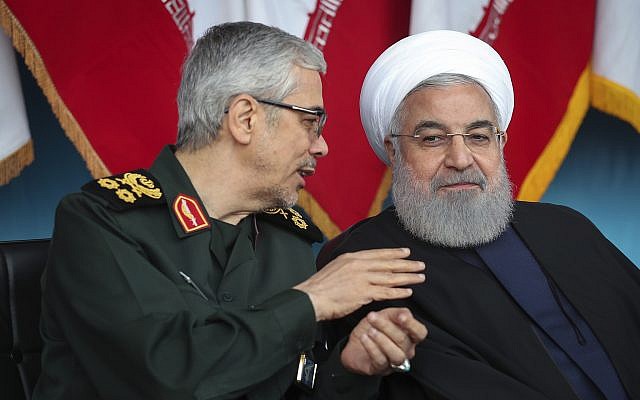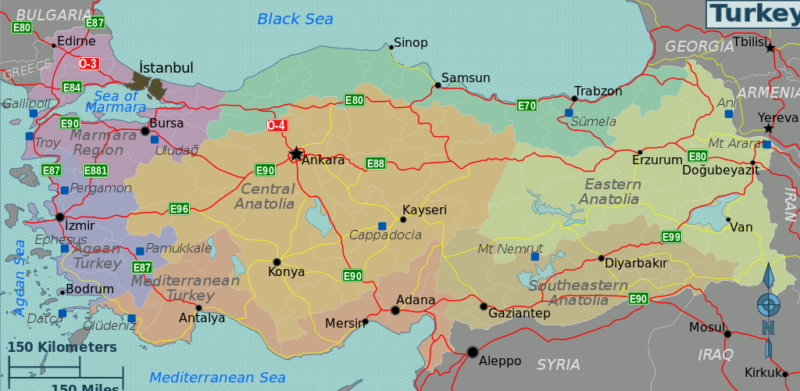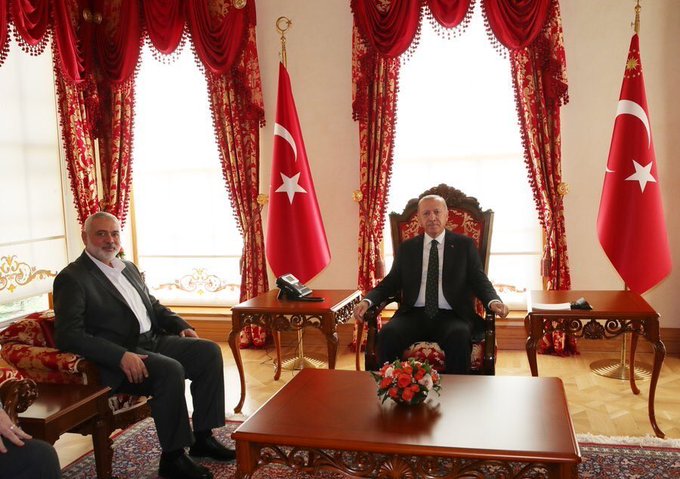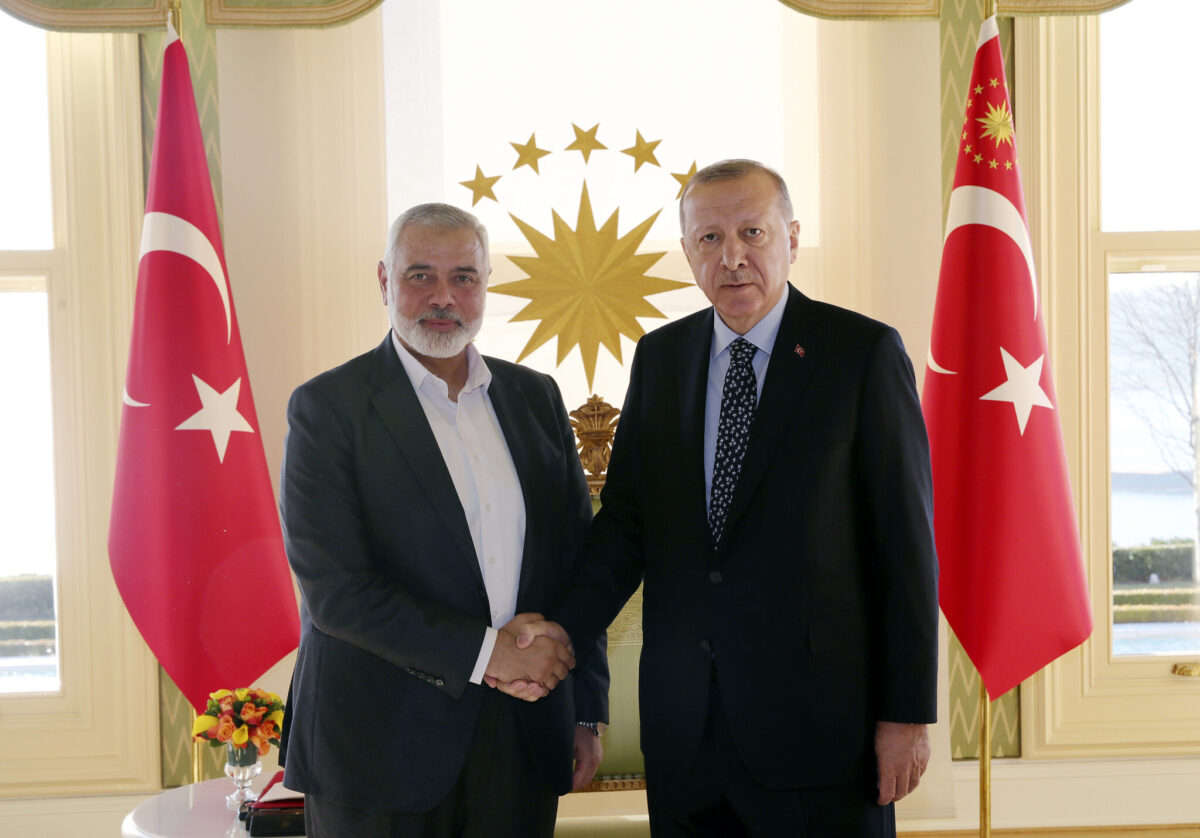Turkey’s reaction to Israel’s landmark peace treaty with the United Arab Emirates is a telling commentary on the misguided policies of Turkish President Recep Tayyip Erdogan.
On August 14, a day after the historic agreement was announced by U.S. President Donald Trump in Washington, Erdogan disclosed he had instructed his foreign minister to either suspend Turkey’s relations with the UAE or recall the Turkish ambassador in Abu Dhabi.

Echoing his master’s voice, Erdogan’s spokesman, Ibrahim Kalin, issued a stinging denunciation of the accord, which calls for the normalization of ties between Israel and the UAE. “History will not forget those who betray the Palestinian people and sell out the Palestinian cause,” he said bitterly. “Turkey will continue to stand by the Palestinian people.”
Erdogan and his Islamist government are strong supporters of the Palestinians and frequently denounce Israel. Turkey’s endorsement of Palestinian statehood and a two-state solution is perfectly fine, being in keeping with the international consensus to resolve Israel’s protracted conflict with the Palestinians, but its denunciations of Israel are gratuitous and indicative of its staunchly pro-Palestinian stance.
When Erdogan excoriates Israel’s rapprochement with the UAE, Turkey finds itself in the company of the Islamic Republic of Iran, a disruptive force which continually threatens to wipe Israel off the map and meddles in the affairs of its Arab neighbors.

The Iranian president, Hassan Rouhani, branded the Israel-UAE pact as “a treacherous act” and warned the UAE not to allow Israel to gain a “foothold in the region.” And in a veiled threat, the commander of Iran’s armed forces, General Mohammed Bagheri, put the UAE on notice that it will be responsible for any damage caused to Tehran’s national security.
Contrary to Erdogan’s reasoning, Israel’s treaty with the UAE is a positive development, despite the fact that it leaves the Palestinians out of the equation. In a concession to the UAE, Israeli Prime Minister Benjamin Netanyahu suspended his destructive plan to annex up to one-third of the West Bank, while top-ranking UAE officials urged Israel to resume peace talks with the Palestinian Authority.
Israel’s conflict with the Palestinians lies at the heart of the Arab-Israeli dispute, and it must be settled to the satisfaction of both sides. Netanyahu is certainly not the Israeli leader who will guide this process. As he put it the other day, the agreement demolishes the argument that “no Arab country would agree to make an official and open peace with Israel before a conclusion was achieved in the conflict with the Palestinians.”
Nevertheless, the majority of Israelis realize that a pragmatic accommodation with the Palestinians is of the utmost importance to Israel if it is to rid itself of its occupation of the West Bank and prosper as a democratic Jewish state at peace with its Palestinian neighbors.
In the meantime, Israel’s agreement with the UAE contributes to stability in the wider Middle East, no small achievement in a region torn by endemic political, religious and ethnic conflicts, and opens up the possibility that more Arab states will join the circle of peace.

Turkey, which is currently engaged in a peacekeeping mission in northern Syria and which remains at war with sectors of the Kurdish community, should understand that these developments should be encouraged.
Regrettably, Erdogan fails to grasp this logic, possibly because he and his ruling Islamic party are so hostile to Israel. Nonetheless, Turkey maintains diplomatic relations with Israel to serve its own interests.
Israel, unfortunately, has another problem with Turkey, judging by what appears to be a reliable story in the Telegraph, a reputable British daily.
It reports in its August 13 edition that the Turkish government, much to Israel’s chagrin, has granted citizenship and passports to seven of 12 senior Hamas operatives living in Turkey. This will enable them to travel more freely around the world.
Turkey’s position is hardly surprising. Turkey is warmly disposed toward Hamas, which rejects Israel’s very existence and has fought three wars and countless skirmishes with Israel since its violent takeover of the Gaza Strip in 2007.

Last year, one of Hamas’ most senior officials, Ismail Haniyeh, visited Ankara. At the end of their meeting, Erdogan said that Turkey “will keep on supporting our brothers in Palestine.”
According to the Telegraph, Hamas agents in Turkey engage in fundraising but are also involved in planning attacks against Israel. Turkey flatly denies that it permits such activities on its soil, but the Telegraph article appears plausible.
Turkey, the first Muslim state to recognize Israel, is acting irresponsibly by denouncing Israel’s peace accord with the UAE and supporting Hamas to such a dangerous degree.
Erdogan would be well advised to rethink his antagonistic policies.
